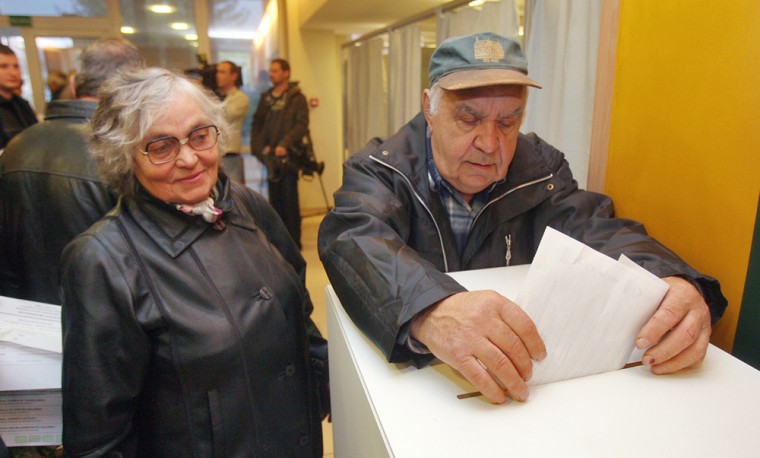A conservative opposition party received the most votes in Lithuania's election Sunday, but it was unlikely to match the combined strength of two rival populist groups, an exit poll indicated.
The poll, released on Lithuania's TV3 network moments after voting ending, showed the conservative Homeland Union with 21 percent in the Baltic country's parliamentary vote, while two allied populist parties — Order and Justice and the Labor Party — mustered a combined 25 percent.
The results could suggest a lengthy battle for the next government, with the conservatives vying with the populists, including impeached former President Rolandas Paksas, for the right to form a coalition.
Paksas' Order and Justice party was in second place with 14 percent of the vote, one point ahead of the governing Social Democrats, who have controlled the prime minister's position for the last seven years, said the survey, conducted by the Rait pollster.
TV3 said Sunday the poll included more than 4,600 respondents and had a 1.5 percent margin of error.
Referendum on nuclear plant
The vote also featured a nonbinding referendum on whether to keep a flawed, Soviet-era nuclear plant operating beyond its scheduled closure.
The Central Election Commission said Sunday there was a chance that the referendum, which is nonbinding, would be invalid due to low voter turnover.
Later in the day, only 45 percent of registered voters had cast a ballot, the commission said, while the law requires a minimum 50 percent for a referendum to be valid.
The Chernobyl-style nuclear plant's design flaws scare EU members, who insist that it be closed on its scheduled date in December 2009. Many Lithuanians claim that shutting down the Ignalina plant, which gives them energy independence, would leave them vulnerable to Russia, an unreliable energy supplier.
If victorious, Paksas, an impeached former president, and Viktor Uspaskich, who made his fortune in Lithuania selling jarred pickles, could form the backbone of a populist coalition that would likely talk tough to the European Union on the nuclear plant and improve relations with neighboring Russia.
Uspaskich's Labor Party was in fifth place in the exit poll with 11 percent.
High inflation and slumping growth
A victory for the populists would be a tremendous blow for President Valdas Adamkus, who has fought bitterly with both Paksas and Uspaskich, and has appealed to the electorate not to vote on an emotional impulse.
Lithuania, which regained independence in 1991 amid the collapse of the Soviet Union, experienced an economic boom after joining the EU in 2004. However, the economy overheated and, like its Baltic neighbors, Lithuania is now struggling with high inflation and slumping growth.
Paksas was impeached in 2004 for violating the Constitution and abuse of office, making him the first European head of state to be impeached and removed from office. Though he is constitutionally barred from occupying public office, he could wield tremendous influence on the sidelines.
Uspaskich was forced to resign as economy minister after coming under investigation for a conflict of interest case involving Russia, where he was born.
